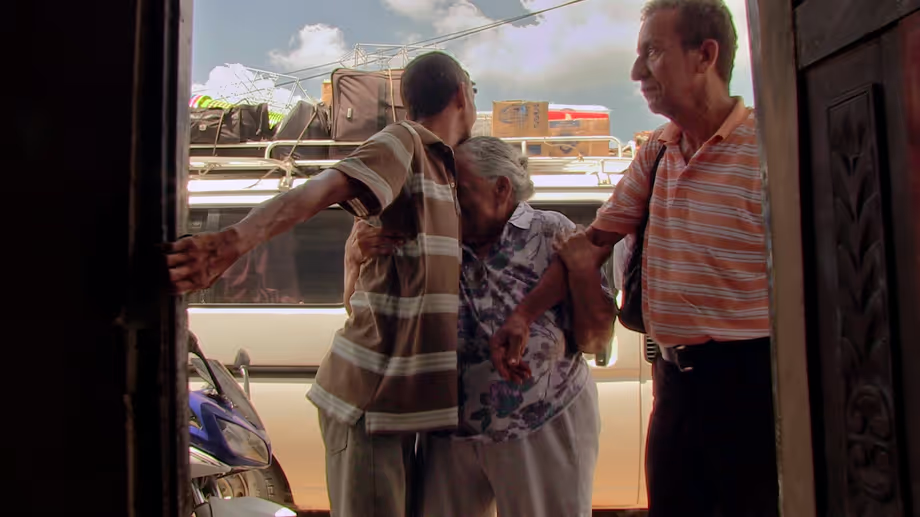Discussion Guide
Grades 6-8
Grades 9-10
Grades 11-12
La Casa De Mama Icha Discussion Guide Taking Action and Resources
Taking Action and Resources

TAKING ACTION
*For any of these activities, please prioritize your safety and that of others so that no one is made physically more vulnerable (such as by exposure to COVID-19) through participation.
- Support local businesses which are owned and operated by immigrant families.
- Host dinners in your local community in which you invite people from different backgrounds to spend time together and get to know one another informally.
- Follow and support the work of Michelle Angela Ortiz as she makes visible the struggles of immigrant families.
- Follow and support the work of the National Domestic Workers Alliance as they advocate for workplace protections for the nearly 2.5 million nannies, housecleaners, and home care workers who do the essential work of caring for our loved ones and our homes.
- If you hire in-home care, provide vacation time, personal days, sick days, and healthcare whenever possible.
- Modeled on the StoryCorps project, virtually or in-person, take an hour to audio record an interview with a loved one and learn more about their journey, their hopes, dreams, and fears. This way, when it’s time to make decisions together about a loved one’s quality of life, you have a sense of what it is they want for themselves.
- If you’re in a caregiving role, join support groups to make sure you are taking care of your own well-being and mental health so that you can avoid the negative consequences of “caregiver stress.”
- Follow and support the work ofAARP Policy Institute as they advocate for pay for family caregivers.
- Lead financial literacy workshops for women in your neighborhood, especially women who might send remittances to family members abroad. Support women in learning more about bitcoin and alternative, digital money transfer options that do not charge the exorbitant fees of companies like Western Union.
- Gather with people in your neighborhood and start mutual aid efforts to meet the care needs of everyone in the community. Consider: meal shares to provide meals for caregivers; taking turns to share caregiving responsibilities; raising funds to support caregivers; hosting self-care nights for wellness and balance.
- Inform yourself about US interventions in South America, interventions which have contributed to unsustainable economic conditions and violence within South American countries, thus compelling waves of migration away from South America.
- So much misunderstanding is fostered through lack of exposure to different perspectives and lifestyles, and all change work is best developed by hearing from the people most affected by the issues. Volunteer to support an immigrant rights organization or to spend time with an elder in your community as a way of spending time with, giving back to, and learning from people most affected by the issues.
RESOURCES
A list of relevant social movements, non-profits, and organizations. Be sure to include brief descriptions for each org and a link. Here is an example.
- AARP Policy Institute - site of the The AARP Public Policy Institute (PPI), which conducts research and lobbies to support family caregivers, recognizing family caregivers as are an essential part of the social, health, and economic fabric of the United States.
- National Domestic Workers Alliance - The National Domestic Workers Alliance (NDWA) works for the respect, recognition, rights and workplace protections for the nearly 2.5 million nannies, housecleaners, and home care workers who do the essential work of caring for our loved ones and our homes.
- National Alliance for Caregiving - Located in the heart of Washington, D.C., the National Alliance for Caregiving conducts research, does policy analysis, develops national best-practice programs, and works to increase public awareness of family caregiving issues. See their list of resources for caregivers.
- ElderCare Locator - a public service of the U.S. Administration on Aging connecting you to services for older adults and their families.
- UNCDF Migration & Remittances program - the UNCDF is working with international and regional organizations, with national governments, with financial service providers, and with migrants themselves to make remittances work better for families and local economies around the world. This program has a specific focus on empowering women.
- List of resources for supporting immigrant communities
- Protecting Immigrant Families: A network anchored by the National Immigration Law Center (NILC), the Center for Law and Social Policy (CLASP), and member organizations, the “Protecting Immigrant Families, Advancing Our Future” (PIF) Campaign aims to advance and defend access to health care, nutrition programs, public services and economic support for immigrants and their families at the local, state and federal level.
- Women’s Institute for a Secure Retirement: supports, educates and provides resources for women and women caregivers to plan for a secure retirement.
- Shut Down Berks Coalition: The Shut Down Berks Coalition is a group of organizations and individuals fighting to close the Berks family prison in Pennsylvania and end the practice of imprisoning immigrant families in the U.S. Members of the coalition include organizers, lawyers, immigrant leaders, and allies.
- International Day of Family Remittances is celebrated every year on 16 June to recognize and support the contributions of migrant workers and their families. Their website is a rich resource for understanding the transformative value of remittances. https://familyremittances.org
- Migration Policy Institute Diaspora Profile (2015): The Colombian Diaspora in the United States
- People Move blog: a blog by World Bank economist, Dilip Ratha, dedicated to research on the relationship between remittances and economic development.
- Mi Casa My Home: a multimedia web portal from the team behind La Casa de Mama Icha, which will chronicle and contextualize people’s experiences with “remittance homes” around the world

